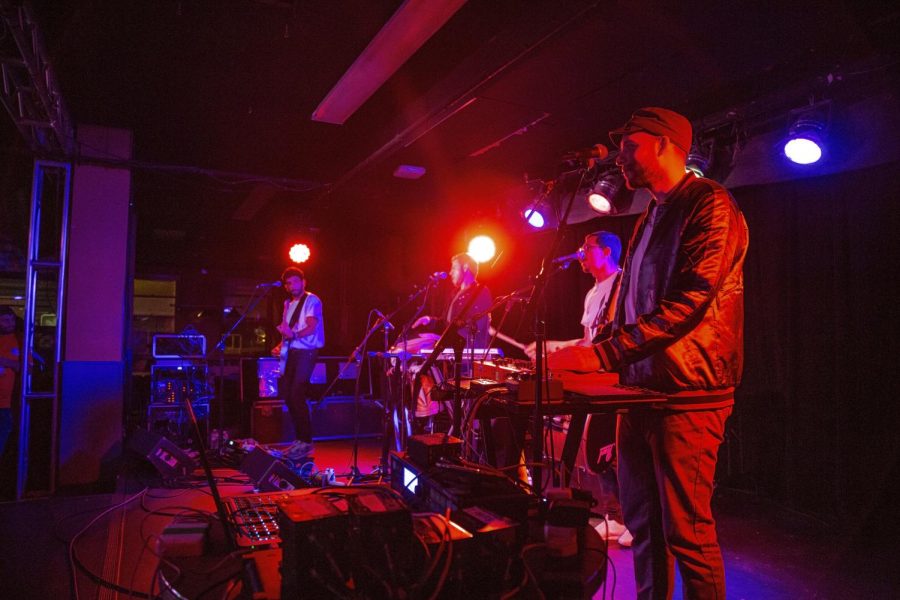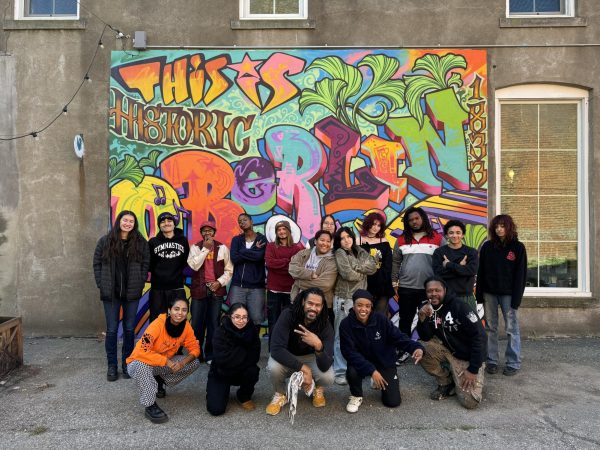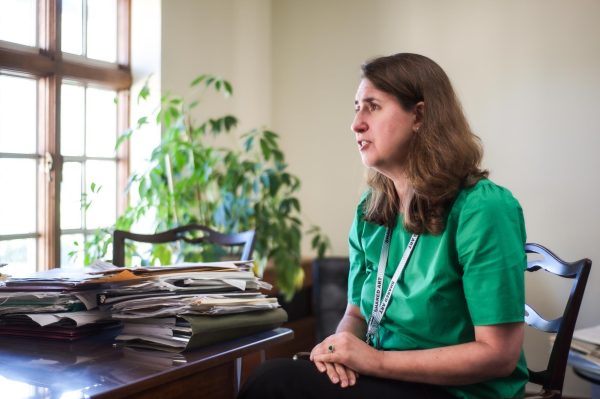Jordanian-Palestinian Band 47SOUL Performs at ‘Sco
The band members of 47SOUL light up the ’Sco stage during their Tuesday night performance.
In a rare moment for a weeknight performance at the ’Sco, a band had students on their feet and dancing their way into the next morning. Oberlin Students for a Free Palestine and Jewish Voice for Peace sponsored a performance by Shamstep group 47SOUL and pop soloist Zach Matari which took place this past week.
47SOUL is an Arab group that blends traditional dabke music with punchy electronics and synthesizers. This combination creates an upbeat and danceable hip-hop sound with hints of reggae, including exciting vocal runs and satisfying melodies. “Dabke” in Arabic means “stamping of the feet,” which is the traditional Arabic folk dance that accompanies the music.
There was something satisfying about the punch of the Sbeit’s bass drum intertwining with Kwaik’s darbuka. Heavy synths and rhythm guitar rested on the driving percussion, and the mixture of Arabic and English lyrics filled the venue. Audience members were quickly engaged by captivating synthesizer solos and choruses that were easy to sing along to, such as the lyrics in “Mo Light:” “We’re good, we’re good/ We just need more light/ We just need more light.”
“As an audience member and friend of the organizers, I felt like it was one of the best and most energetic ’Sco performances I’ve seen in a long time,” College third year and SFP member Zoe Jasper wrote in an email to the Review. “It was so cool to see people both having fun dancing and learning about SFP’s Sabra Boycott at the merch table.”
47SOUL pioneered the term “Shamstep” as a way to define their blend of tradition and electronics. “Sham” refers to Bilad Al Sham, a former region that included modern Palestine, Syria, Israel, and Lebanon. On the group’s website, their personal statement reads, “Their lyrics, mixing Arabic and English, call for celebration and freedom in the struggle for equality, inside Bilad Al Sham and throughout the world.”
“[SFP] strives to fight for a free Palestine in our own way on Oberlin’s campus, connecting Oberlin to Palestine through the ultimate idea of decolonization,” College third-year and SFP liaison Alex Black Bessen wrote in an email to the Review. “In bringing 47SOUL we saw an opportunity to bring music to Oberlin that resists occupation, apartheid, and the erasure of Palestinian people and culture. Bringing 47SOUL was an opportunity to present radical decolonial action and consciousness in a fun and musical way.”
Political history and activism is a priority for the 47SOUL. None of the members grew up in Palestinian National Authority, but they are all Palestinian. They all hold different passports, which made traveling and meeting in the Middle East difficult, a common issue for bands in the region. 47SOUL’s message of political unity has been successful so far, and the group raised over $30,000 in a crowdfunding campaign to finance the self-recording and release of their 2015 EP, Shamstep. Since then, 47SOUL has released a single in 2017, and an eight-track album titled Balfron Promise, which refers to the 1917 Balfour Declaration that established “a national home for Jewish people.”
The concert opened with Zach Matari on vocals and Emmanuel Mendez on drum pad and backup vocals. The pop duo used a backing track and Mendez maintained a driving rhythm with techno-inspired beats. The modest crowd at the beginning of his set slowly built up, and the duo played more confidently as the audience grew.
Delving into his Palestinian and Brazilian heritage, Matari uses his position as an artist to advocate for social change. He has a knack for strong hooks and pop melodies, with a vocal performance reminiscent of Maroon 5’s Adam Levine.
“I really liked how interactive it was,” College third-year Gwen Cappel-McCoy said after attending the concert. “I thought [the] music was incredible.”
47SOUL and Zach Matari put on a successful show, exhibited by the high student turnout – especially for a Tuesday night performance. It was an enriching performance that gave light to the creation of a new genre blending traditional and modern music, as well as building on the political call for inclusivity and unity.
“Palestine is alive, it is a real place with real people and as Oberlin students, we have many ways to fight for the freedom of Palestine,” Black Bessen wrote. “Part of our mission in bringing 47SOUL was to remind students that Palestine is not hypothetical, and we have a duty to fight for a free Palestine.”
One can only wonder what’s next for 47SOUL, how they will continue to innovate tradition, and who will follow in their footsteps.








